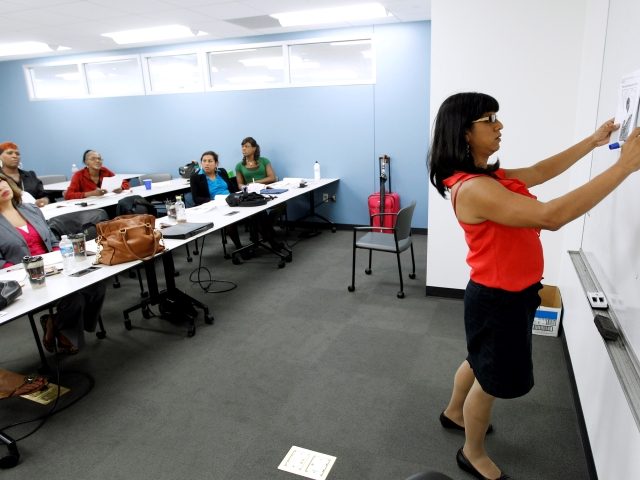Less than a third (29 percent) of Americans think workforce diversity efforts are improving race relations, even as the “equity and inclusion” industry is expected to see billions of dollars in growth over the next several years.
While most Americans support efforts to increase diversity in the workforce, many believe the practices are “likely to lead to racial and gender quotas and most don’t think diversity efforts are improving race relations,” according to the new poll from Rasmussen Reports.
Just 29% Think Workforce Diversity Efforts Improve Race Relationshttps://t.co/fkcRbxZ23J#DiversityandInclusion #racerelations pic.twitter.com/APzn4pCwbK
— Rasmussen Reports (@Rasmussen_Poll) June 20, 2022
A survey of 1,000 American adults on May 31 and June 5 found that 33 percent think workforce diversity efforts make race relations worse. Twenty-six percent say promoting diversity at work “doesn’t make much of a difference in race relations,” and 13 percent are unsure. Sixty-five percent believe it is likely diversity efforts at companies “result in racial or gender quotas.”
“That includes 35 percent who think it’s Very Likely diversity efforts lead to hiring quotas. Twenty percent don’t think diversity efforts are likely to result in racial or gender quotas, and 16 percent are not sure,” according to the poll, which has a ±3 percent margin of sampling error at the 95 percent confidence level.
Woke Diversity, Equity, and Inclusion training (DEI), often infused with Marxist ideology and Critical Race Theory, have spread to many companies, schools, and even to the highest levels of government — especially following the death of George Floyd and the subsequent push by Black Lives Matter to “dismantle structural racism.”
For example, Verizon reportedly taught its employees in diversity training that capitalism is fundamentally racist and that “weaponized White privilege” is a danger to African-Americans, according to a report in City Journal.
SCOOP: Verizon teaches employees that capitalism is fundamentally racist, that "weaponized White privilege" is a danger to African-Americans, and that employees should support "defunding the police."
I've obtained whistleblower documents that will shock you.
— Christopher F. Rufo ⚔️ (@realchrisrufo) August 25, 2021
The global market for these types of trainings was estimated to be $7.5 billion in 2020 and is projected to reach $15.4 billion by 2026, according to Globe Newswire. The United States accounted for $3.8 billion of the DEI market in 2021, a 45.5 percent share of the global market.
Unsurprisingly Democrats (45 percent) are more likely to believe workforce diversity efforts improve race relations. Only 19 percent of Republicans and 21 percent of unaffiliated voters agree. However, 30 percent of Democrats think these trainings make race relations worse, as do 41 percent of GOP voters and 29 percent of unaffiliated voters.
Seventy percent of Democrats, 31 percent of Republicans, and 49 percent of unaffiliated believe “companies generally should seek to encourage racial and gender diversity in their workforce.” A majority of Republicans (55 percent) disagree.
The survey found that majorities of every racial category think it is “at least somewhat likely” that diversity efforts at companies lead to racial and gender quotas.
Americans under 40 are more likely to believe in workforce diversity efforts and less likely to think these efforts make race relations worse. Government employees (40 percent) and Americans earning above $100,000 are also more likely to think workforce diversity efforts lead to improved race relations.

COMMENTS
Please let us know if you're having issues with commenting.